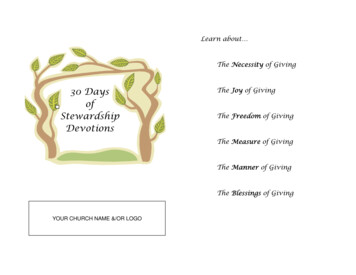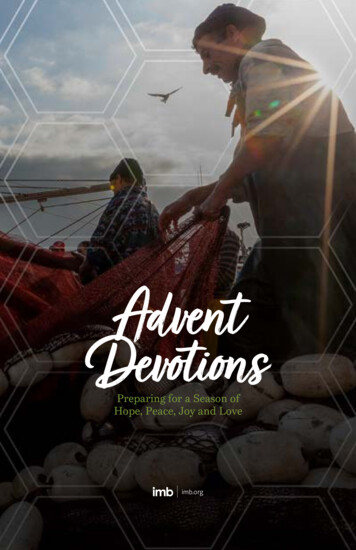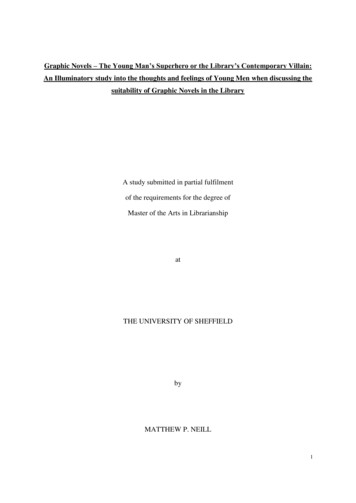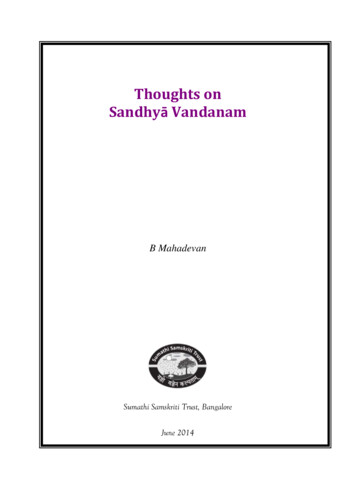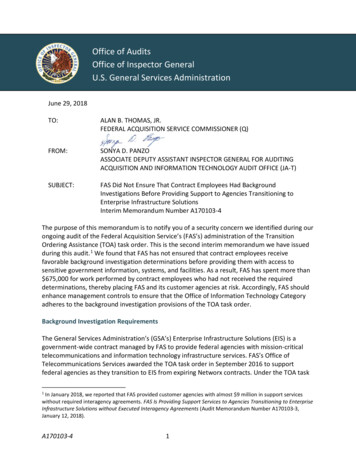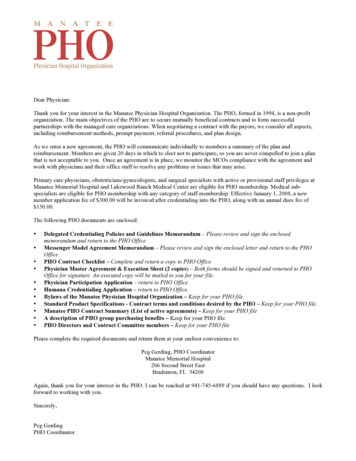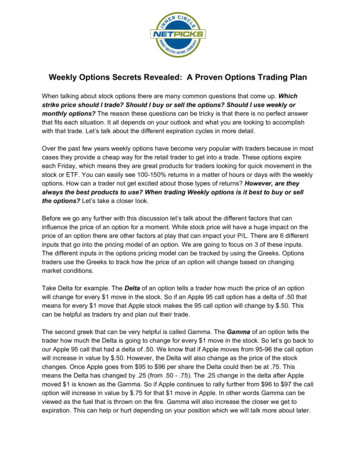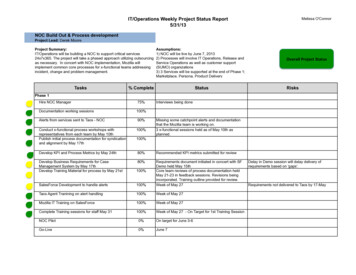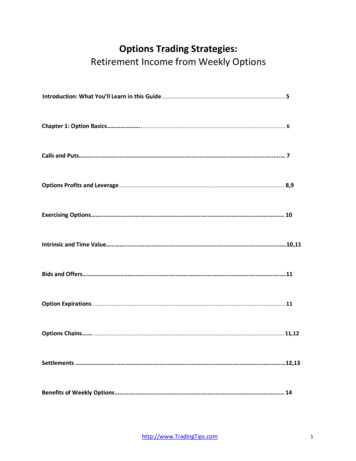
Transcription
Weekly Thoughts for Office DevotionsSpace for GraceISBN: 91-85141-23-2Print: 2015, Print OneDesign: Elaine VitikainenCover photo: Ninna Ekstrand, Swedish Mission CouncilThis booklet was produced with financial support from Sida, Norad and Danida.The texts of this booklet were originally published on www.spaceforgrace.net
Oh no, not staff prayers.Staff prayers should be a time of spiritualrefreshment, an opportunity to connect withourselves, each other and with God. But toooften they feel like a burden, sapping precioustime and energy from our ‘real’ work. If youhave ever been in such a situation or are justlooking for new ideas, then this booklet may befor you.People have found the regular WeeklyThoughts from the Space for Grace learninggroup really helpful in making office prayersmore interesting. It has helped them establisha healthier spiritual rhythm at work. So wepicked out 52 of these Weekly Thoughtsfor this booklet. They reflect a diversity ofchurch traditions as well as cultural contexts.Authors come from all over the world - Asia,Africa, Europe and North America. We allshare a commitment to integrating faith inthe workplace, creating space for grace in aninclusive and energising way, irrespective ofdenomination.Use this booklet in whatever way works bestfor you – on your own; in your teams, in yourwhole organisation. Be creative. Ask people toshare their own experiences. Look together forBible passages that reflect the message. Makeup your own application questions. But mostof all be courageous to apply whatever youdiscuss. Words need action to bring life andchange./Space for Grace
WEEK 1Prayer at workA couple of weeks ago I came across twoarticles in esteemed business papers whichreminded me how seriously some of theworld’s largest companies are taking thepractice of meditation. In the HarvardBusiness Review blog network, Peter Bregmanwrote a piece entitled: ‘If you are too busy tomeditate, read this’. Again in the FinancialTimes David Gelles wrote about GeneralMills, the huge US company behind Cheerioscereal and Haagen-Dazs ice cream explaining:“Open the right door on a Tuesday morningand you might find a few dozen team leadersand executives meditating together oncushions, steeling themselves for the workweek ahead. Enter a conference room a fewhours later that afternoon and witness 50senior executives standing on one leg in thetree pose as they practise yoga.”Some Christian organisations do not taketheir spirituality as seriously at work as thesesecular businesses do. In our well-meaningefforts to avoid inflicting an exclusive,‘churchy’ religiosity on those around us,we may have thrown the baby out with thebathwater. These businesses are not bringingin spiritual practices because of any faith base,but because they have learnt that this is whatmakes them more productive, more refreshed,creative, and able to make better and wiserdecisions. This week:What could you do to bring in the refreshingresources of your faith into your workplace - ina creative, energising and inclusive way?
WEEK 2If you are too busy, youmay be lostA busy person is not so much active as lost.I was taken aback when I read these wordsby Ruth Haley Barton. After all being busy isa badge of honour in many of our cultures.If we are not busy, then we think we must bewasting our time.Yet being too busy may not be God’s will forour lives. It may indeed reveal that we arelost - not really sure what God wants us to do.So we end up doing too much. We may findit hard to say no when people ask us to dothings. We may need to overcome the insidiousthought that ‘only I can do this well enough’.All of us have human limits. We cannot serveeveryone. We cannot increase our time. Noneof us has super human powers to avoid theneed for rest. We all need to make quality timefor our relationship with God. A recent surveyof 20,000 Christians worldwide revealed that65% rushed from task to task in a way thatinterferes with their relationship with God.Even Jesus did not respond to every need.Luke 5:16 describes how he often took himselfoff on his own to lonely places, even whenpeople were looking for him to heal them. This week:Where do we need to say ‘no’?How can we make more quality time for God?
WEEK 3Listening to God at workI was talking with the international directorof a large faith-based organisation aboutdiscernment (recognising and respondingto the presence and activity of God in asituation). She caught me off-guard when shesaid, ‘Well I trust we would never do anythinglike that in our organisation’.A lot of people are very fearful of tryingto bring discernment into managementdecisions. It feels like we are not valuing thehuman wisdom and common sense that Godhas already given us. For many they have beenemotionally and spiritually damaged by peoplein power inflicting their interpretation of God’swill onto a situation in a manipulative andcontrolling way.But our own intellect may not be enough inmaking decisions. We do not know everythingabout our own organisation. None of us knowsthe future. Our own rational thoughts may wellbe clouded by our own interests and agendas,whether we are aware of this or not. As RuthHaley Barton warns ‘When we set out to dogood, but carry out our attempts without thediscipline of attending to our own stuff whichlies beneath and opening ourselves up toGod’s presence, evil is always close at hand’.I get worried when I read in Isaiah 55:8 thatGod declares “For my thoughts are not yourthoughts, neither are your ways my ways.”We may need to make more opportunitiesto listen to God about organisational issuesat work, like one CEO of a large ChristianNGO in UK who takes two hours every Fridaylunchtime just listening and praying. This week:What decisions are coming up for you at workover the next month where you need God’sdirection and leading?What will you do to try and create the space tohear from God?
WEEK 4Identity in a fishbowlWe’re in the midst of a restructuring process.It is scary, yet also interesting and challenging.As we are a small organisation, I thought Iknew my colleagues quite well. But whenmy department was merged with another, Iquestioned what I really knew about them.In my new unit, we realised early that weneeded external help to facilitate the merger.For ten years, we had each developed ourown ways of working and team culture. Nowsomewhat reluctantly, we found ourselvesthrown together. The consultant helped ustalk about issues we had never mentionedbefore. I found out new things about each ofmy colleagues, including my old team. I evenlearned new things about myself.I found the fish bowl exercise particularlyuseful. Each of the former teams sat in themiddle and were encouraged to “talk about ourculture and work methods”, while the otherteam was listening in silence seated in a circlearound us. Then the teams switched places,and the team in the middle talked about whatthey had heard while listening to the otherteam. Then the first team got back in themiddle to reflect on what the other team hadheard as they listened.This exercise and the dialogues thatfollowed gave new insights into what we hadbeen as teams and what we wanted to be asa unit. It reminded me of Jesus asking: “Andyou, who do you say I am?” In the uncertaintyof change, Jesus invited his closest followersto reflect on what others said, and what theythemselves believed. This week:Take the time to listen carefully to yourcolleagues and find out something new aboutthem. Make sure you also share somethingnew about yourself.
WEEK 5Discussing theundiscussableThere are always undiscussable issues in anyorganization. There are usually ‘elephants inthe room’. We shy away from naming them.We steer clear of brutal facts. It would seemdisloyal to bring them up. We fear if we bringup such issues, we will be labelled a rebel andmay even face reprisals.they will be a strong resistance and render thewhole task useless.2. Create an atmosphere of liberty – Peoplewill only open up in a ‘safe space’ when thereis a spirit of freedom in the place. “I felt theleadership wanted to hear this and did notfeel I would be penalized”, one excited leadercommented after the meeting.3. Use Diplomatic Honesty – Jesus certainlydid not shy away from speaking the truth. Buthe always did it with grace and compassion.4. Ask the right questions – Framing theright questions around issues that oftenremain undiscussed requires discernmentand wisdom (and even bouncing off leaders inadvance). Some of the questions that workedthose days for me were:A few weeks back I was asked to facilitate twomeetings of over 250 leaders from my church.Rather than dodge the big issues, I believedit was vital to put them on the table – even tothe point of addressing the taboo subject ofsuccession from the founding pastor (in hispresence). This was not easy. I think it onlyworked because I managed to:What would you do differently?What are the game changers here?What prohibits us from progressing forward? This week:In which work situations do we need to discussthe undiscussables?1. Get the top leadership on my side – If youdo not get visible support from the leadership,What questions might energise change in thesesituations?
WEEK 6The widow’s miteThe other day I came across an ancient coin in anantique shop. It dated from Pontius Pilate’s timeand became known as the ‘widow’s mite’ – inreference to the incident in Mark 12: 41-44:Jesus sat down opposite the place where theofferings were put and watched the crowdputting their money into the temple treasury.Many rich people threw in large amounts. Buta poor widow came and put in two very smallcopper coins, worth only a few cents.Calling his disciples to him, Jesus said, “Truly Itell you, this poor widow has put more into thetreasury than all the others. They all gave out oftheir wealth; but she, out of her poverty, put ineverything—all she had to live on.A year ago, I found myself a few thousand milesaway in Indonesia facilitating a small leprosyNGO do some strategic planning. As I listenedto the gory descriptions from Jhon, one ofthe field workers, of the care he gives to thosedisabled by leprosy I remembered the widow’smite. I realised rather painfully that like the richpeople in the temple, my giving to developmentwas highly visible – travelling across the world,staying in hotels, facilitating events, writingbooks. I had slipped into thinking how importantmy contribution was. Yet I am only giving outof my wealth and then being well-rewarded fordoing so.Writing books or even facilitating events isnot ‘real’ development work. Developmentdoes not take place in offices or behindleaders’ desks or even in computers. Changehappens away from the spotlight, in poorcommunities, on the streets where love andcompassion can be very costly. This week:Who in your organisation is doing the realwork, alongside the people you exist to serve?How can you better support and encouragethem this week?
WEEK 7Taking responsibility tochangeChange only occurs when someone somewheretakes responsibility for a situation. Kurt Lewin,the father of organisational change theories,pointed out more than fifty years ago that thefirst stage in change involved ‘induced anxietyor guilt – a realisation that I am in some wayresponsible’. Instead of externalising blameonto other people, they realise that they arein some way responsible and that they can dosomething about it.Perhaps then I should not be so surprised thatthe exercise that has had the biggest impact onthe organisations I work with is simply when Istop and ask people to answer:How have I contributed to this situation whichI complain about?I tend to send people away on their own toprayerfully listen to God about how they havecontributed to a situation. In dealing with hurtand frustrations it is important to get peopleout of a ‘blamestorming’ attitude. It allows Godto bring conviction, not people to condemneach other. I have often found that changingpeople’s physical environment helps in this,suggesting they listen to God while going fora walk or sitting outside. The key is to createa safe space to consider the question in ameaningful way. This week:If we look at our own lives, where are weblaming others for a situation?Let’s stop and ask ourselves: ‘How have Icontributed to this?’
WEEK 8Cheap or treasured wordsI have been thinking a lot about the numbingniceness in many Christian organisations.Such niceness gets in the way of giving honestfeedback. We also compromise our honestywhen we inflate numbers (‘hundreds cameforward’ ‘thousands were reached’) andmake exaggerated claims on God’s behalf. TheNGO world is also full of broken promises. Wepresent unrealistic proposals claiming thatwe will transform people’s lives forever in justthree years – and then we wonder why we sooften fail. Consultant reports are sometimesunsubstantiated opinion disguised as objectiveassessment. Our worlds are awash with cheapwords.The Bible talks about honesty a lot. Matthew5:37 says: “Let your ‘yes’ be ‘yes’ and your ‘no’be ‘no’ – anything else comes from the evilone”. And my least favourite story in the Bibleis the one about Ananias and Sapphira. I don’tlike to think about it too much. Whatever elseit says, it shows me that we need to treat whatwe say with great care and respect - if notindeed fear and trepidation. This week:In the proposals, reports and emails we write;the feedback we give; the suggestions wemake; the arguments we put forward, how canwe treasure our words more?
WEEK 9Humble confidenceI sometimes struggle with working withhumility and confidence. A few weeks ago,I was making some suggestions to my cofacilitator as we were doing some jointplanning for an event. After we finished,he asked me to reflect on my posture whilemaking my contributions. I realised that I haddone it quite hesitantly. I was trying not to bepresumptuous with my thoughts, and this hadaffected my confidence to make a contributionin this particular work situation. It dawned onme that sometimes, because I do not want toappear over-bearing, I deny others the giftsthat I have to offer.In Matthew 5: 13 Jesus challenges us to bethe salt of the world. A good meal needs justenough salt. As Christians if we are ‘too muchsalt’, we can ruin a situation and cause a lot ofharm, while if we are ‘too little salt’, we will notmake any difference. We might as well not bethere. I realised that one of the ways I lose mysaltiness is by holding back on what I have tocontribute.Humility involves recognising and boldlyusing the gifts that God has given us, in theplaces where he puts us. To be the rightamount of salt in team situations, and as anOrganisational Development practitioner,I need to work with both humility andconfidence. If one overwhelms the other thenI lose the beauty and power of who God hascreated me to be. This week:To take the opportunities that God is givingme, where do I need to be both confident andhumble?What do I need to strengthen or let go of sothat I can be the ‘right amount of salt’?
WEEK 10Start with the smallthingsA friend came to visit me in my office. She isnewly employed as an administrator at theparish level of one of our Swedish churches.We talked about our children and things ingeneral for a while. Then she said suddenly:“It took me a while to figure out what waswrong with my new job. I have just realisedthat people around me look stuck. They donot expect results. They do not even want todevelop and change. We are just supposed todo the things we do and that is it. What shouldI do? I want to change this!”Now this is a healthy start, I thought. Someoneeager to lift the curtains, get rid of the dust andopen the window to change. But as I probedwith some questions it became clearer thatthings were not that easy. The organisationis tired to their bones of top-down drivenchange-processes. I really started to feel formy friend, as she was now embarking onthis wonderfully difficult journey of being aninternal change agent. It will be exhausting aswell as exciting.So, what could I say to this? Well, I did notsay much, mostly I listened. My only advicein the end was to try to establish new waysof doing things in the areas of work were shehad control. To model a different practice,even in small ways, can be an example tothe organisation and its management. Itwill take her time to build trust and growinto her mission. As we parted, we agreed tokeep in touch on this. People trying to freeorganisations from their stuck situations needa lot of support. This week:How can you inspire change through the wayyou do the small things?What can you do to encourage the internalchange agents that you know?
WEEK 11Forgiveness at the heartof changeOrganisations are messy places. They are fullof people with different interests, opinions,needs, personalities and priorities. Theinherent tension that fuels creativity oftendegenerates into political manoeuvring andconflict. In any organisation, whether secularor Christian, forgiveness is an essentialcomponent of change. As leaders and changeagents we are called to be ‘stewards of God’sgrace’ in our workplaces (1 Peter 4:10).A few years ago a friend told me thestory about how he was facilitating a veryintensive process with a large secular NGO.In the middle of the workshop a significantbreakthrough occurred and ‘fingers thatwere pointing at each other, suddenly startedpointing at themselves and healing andforgiveness took place’. But at the end of theworkshop, rather than celebrate this progress,his young colleague pushed the client stillfurther. He said that he felt that there wasstill unfinished business. There was a loadedsilence. He challenged them: ‘I think it is soimportant that you should not even allowthis weekend to go by before you have talkedthrough the issues and forgiven each other.’On the Monday the Director emailed them,describing how people had spontaneously gottogether over the weekend and talked throughthings they had kept buried for some time.In the days that followed they continued toreceive e-mails from staff, many of whichsaid: ‘It feels as if I am working in a differentorganisation; I have hope to continue.’ This week:How can I promote forgiveness in myworkplace?
WEEK 12Restoring graceSo often recently, over coffee and meals, Ihave been listening to leaders expressingtheir disappointments. Many had felt ledby God to start new projects, ministries andprogrammes, but barriers were springingup all over the place. The visions they weretrying to be faithful to were not being realised.Instead they felt under attack. Leaders wereleft perplexed and dismayed. Had they notheard God? Where was God in their struggles?I felt frustrated on their behalf. But as I readActs 23, I found myself deeply challenged. Ipictured the Apostle Paul sitting in chains inthe Jerusalem jail. I wondered whether hewas feeling the same perplexity and dismayas these leaders I have been listening to.And then God came to him in that cell Yetnot to rescue him and remove him from thecircumstances. No, God just reminded Paulthat he was called to Rome. God came toreiterate His promise and to challenge Paul toplace his hope in God’s provision, not in hiscircumstances.We too are called to spend much of our timeand efforts in the space in-between our heart’sknowledge of God’s promises and the realityon the ground. May we take courage, nurturehope and let God unfold promises in everycircumstance. This week:Are there any God-inspired visions or truthsabout God’s provision in your work that youfeel you have lost?Are there any areas of your life where youcould invite God to restore your hope thisweek?
WEEK 13When tempted to give upWhen the morning’s freshness has beenreplaced by the weariness of midday, whenleg muscles quiver under the strain, the climbseems endless and suddenly nothing will goquite as you wish it is then you must nothesitate.Never for the sake of peace and quiet denyyour own experience or conviction.Determination has never been my strongestsuit. I enjoy being thought of as ‘laid-back’, butthis means by nature I look for the easy wayout. I have never needed to reach the summitof a mountain climb. I tend to give up quiteeasily. Perhaps this is why I am so drawn tothe contrasting writings of Dag Hammarskjöld,the Swedish diplomat who became SecretaryGeneral to the UN. In his book Markings, hewrites:Life yields only to the conqueror. Never acceptwhat can be gained by giving in.Life only demands from you the strength youpossess.Only one feat is possible – not to have runaway.I often challenge myself with these quotes.I have to work hard to resist the temptationto give up and take the easy way out whensituations are not as I had hoped. This week:Where are you tempted to give up at themoment?What is God’s teaching you in that situation?
WEEK 14Greed in disguiseGreed is good at disguise. It can masqueradeas success or even blessing People used to talk a lot about ‘small isbeautiful’. But nowadays bigger alwaysseems to be better. Some agencies (andeven churches) may have become ‘fiscallymesmerised’ by ever increasing incometargets. A desire for growth becomes the maindriver for decision-making. We use size todefine success. We are really proud of growth.We justify this fixation on the basis thatgrowth means we can reach more people andchange more lives. But there may be a shadowside to this growth objective. Our motives maynot be wholly pure. Our desire for growth maybe influenced by greed.Greed is not just something out therein the organisations, it affects us all asindividuals. As a consultant, I am deeplyuncomfortable when clients ask ‘What do youcharge?’ I know I have to earn an income,but how much is enough? I may only charge‘the market rate’, but my daily fee may bemuch more than a local salary for a month oreven two Am I really worth that amount ofmoney? Or has greed altered my perspective?Greed is all around us. It is not just in richercountries. We need to be on a constant lookout. This week:What disguises does greed wear in your life?How can you fight against it?
WEEK 15The perfect structure - acostly obsessionWe are mistaken if we imagine there is aperfect structure. Yet so many insist that ifonly we got the structure right then all wouldbe well. In one organisation I have workedwith, they have changed their structure threetimes in the last two years and are about toimplement a fourth one! But there is no suchthing as the perfect structure. How we chooseto divide up work in an organisation willalways be full of compromises and challenges.The ways in which organisations behave tendto be deeper than just the structure. So even ifwe change the structure the same issues soonresurface, simply in a different place.This obsession with structure is costly. Everytime a new structure is implemented, staffhave to shift roles, learn new skills and relateto a different set of people in a different way.This is emotionally and mentally exhausting.It frequently drains vital energy away fromthe actual mission of the organisation.Organisations who are restructuring oftenbecome so inward looking that they losefocus on who they are here to serve. They aredemotivating places to work.Perhaps as leaders and consultants we arecomplicit in this. We want to appear able to fixproblems. And structure is perhaps one of themost visible solutions. Perhaps we should turnour attention away from simplistic structuralsolutions and deal with the more fundamentaland complex issues of people. This week:Let’s not think of the people merely as aworkforce to conform to whatever changesappear right to us. Instead, let’s consider howwe invest in people, helping them to realisetheir strengths and to move towards realisingtheir potential.
WEEK 16What motivates you?At a facilitation course this summer, someoneasked me “What motivates you to do whatyou do?” I quickly respond: “God’s love forme motivates me to do what I do”. My answercame easily. Perhaps too easily.I remembered this answer when I returnedfrom a long holiday recently. Instead ofcoming back refreshed, I quickly felt drainedand uninspired as I met the same frustratingwork situations I had left behind. I was alsoreminded of my easy answer in a number ofconversations over the past few weeks withfriends who work in churches. Too many arethinking of leaving, discouraged by the peoplethey work with and the circumstances aroundthem.As I pondered I realised that if I rely on peoplearound me to dictate how I respond to the callthat God has given me, I will be continuallyin the state of confusion. God’s love for me isgreater and unchangeable. I realised I shouldnot run away from what I was called to dosimply because of the external circumstancesor other people. I need to persevere. This maynot automatically change the situations thatI’m facing in my work. But it does change myresponse. It reconnects me with the source ofmy motivation and inspiration – God’s trueand perfect love for me. This week:Reflect on the question, “What motivates you?”Invite God to speak to your heart.
WEEK 17People of peaceLike many of you my work has taken me awayfrom home for varying amounts of time - aprivilege but not without challenge. A whileback a close friend began to pray for ‘people ofpeace to cross my path.’ I have followed thisexample and been overwhelmed by the waythis prayer has been answered time and again.Have you ever looked back on a piece ofwork and thought, “That person made all thedifference?” So often, I have found that thereare one or two individuals I meet during aconsultancy that seemingly have been put inthat organisation for such a time as this. Theyare courageous individuals who continue toallow themselves to be affected by the HolySpirit for communal good; men and womenwho often have quiet ministries to their teams;people who are committed to the nudging ofthe Holy Spirit more than vision statements,strategic goals or expert consultants.Jesus encouraged his followers to faithfullylook for the individuals who were alreadypartnering with the Holy Spirit in theirown communities and directed them to payattention (Luke 10). This week:Pray for ‘people of peace’ to cross your path?Pray for them to have discernment in listeningto God for their organisations, courage inacting when necessary and influence in thelarger life of the organisation.
WEEK 18Jealous JonahI have always been captivated by Jonah’s story.How despite being a prophet he ran awayfrom God’s call; survived a violent storm; wasmiraculously saved by a great fish; went on togive God’s message to the people of Ninevehabout their wickedness; saw how they repentedand yet was left angry and upset I’m still amazed by the part about themiraculous rescue in a fish, but as I growolder I think I understand more of Jonah’sangry response to God’s abounding mercyand forgiveness. He was jealous – jealousthat these wicked people could share in God’sblessings.Are we ever jealous in our own organisations?I remember one particular project managers’meeting. We were discussing a need toincrease local salary levels. Some expatspresent refused. They argued “But this willmean that some even earn more than wedo”. They might have professed a belief thatpeople are equal in the sight of God, but theirbehaviour didn’t show it. It made me thinkhow quick we are to claim God’s blessing forourselves, but how we often jealously denyGod’s blessing to others. This week:Who in our organisations should we beblessing?Whose change and success should we becelebrating?
WEEK 19Radical grace“At our core we truly believe in the concept ofradical grace”. This was not the usual ‘rights’response I was expecting from the ChristianNGO I was working with earlier this week.They went on to give quite uncomfortableexamples of putting radical grace into practice– of not just forgiving and forgetting, but goingfurther to restore the person. It sounded a bitlike Philip Yancey’s term, ‘the scandal of grace’.It reminded me of an article I read in theTimes newspaper last year which wasanalysing the transformed fortunes of theworld-beating English cricket team. Under theheadline “Winning culture a matter of trustand forgiveness” it described how so manyteam members had been regularly forgivenrather than penalised - “allowing playerafter player to concentrate on wider issuesthan self”. It is not that there are no longerany sanctions for poor performance, but thedefault option has radically changed to trustand forgiveness.So forgiveness is not just for a Sunday inchurch or even Christian workplaces. Itis something that all organisations need,whether commercial businesses or sportingteams. Forgiveness is something that cannotonly change individual lives, but can alsomake a tangible difference to organisationalperformance. This week:What would radical grace look like in yourorganisation?
WEEK 20Love in conflictWhy are personnel conflicts so difficult tohandle in a Christian organisation? A formercolleague often said how much easier it was todeal with conflict when he was working witha secular organisation. Some cultures make iteven harder to handle conflict positively. I wasborn and raised in the Philippines and havealways been taught to overlook mistakes andavoid conflict as much as possible.I was recently part of an organisationalassessment process. Some real issues ofconflict were surfacing. An individual spokeup, saying, ‘We should stop talking aboutthis now and simply love one another’. Theothers assented saying, ‘Yes, this is what Godcommands us’.While loving one another is what Jesusrequires of us, how is love best expressed in asituation of conflict? How many conflicts havegone unresolved because we don’t talk aboutit? Do we too easily sweep conflict under therug using the excuse of love? Sometimes it ismore loving to try to resolve conflicts ratherthan pretend they are not there.In my experience, when a conflict is notproperly resolved
Thoughts from the Space for Grace learning group really helpful in making office prayers more interesting. It has helped them establish a healthier spiritual rhythm at work. So we picked out 52 of these Weekly Thoughts for this booklet. They reflect a div
